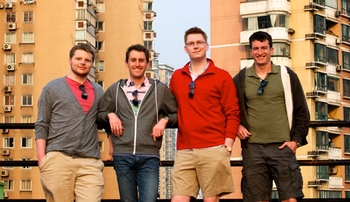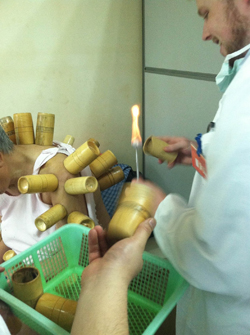Four UNMC fourth-year medical students recently saw acupuncture and “fire cups” used hand-in-hand with modern medicine practices during formal, one-month rotations in Traditional Chinese Medicine (TCM) in Shanghai.

|
| Shea Welsh, M.D.; Ryan Edwards, M.D.; Jonathan Fullner, M.D.; and Jeremy Stone, M.D.; in Shanghai, where they spent April on rotations in Traditional Chinese Medicine before they graduated from medical school in May. |
The UNMC students worked at Renji Hospital in the heart of Shanghai in April. There they saw health professionals use TCM methods such as “fire cups” — heated suction cups placed on skin to promote blood flow — and moxibustion — the burning of mugwort herb over the skin — as readily as they would pain medications and stitches.
“Learning about Traditional Chinese Medicine … was an invaluable experience that has expanded our perceptions about the benefits of alternative medicine to a degree that wouldn’t have been possible here at home,” said Ryan Edwards, M.D., who was one of the students on the rotations. “We were impressed by how effective TCM was in treating common ailments, particularly pain syndromes.”
Shared experiences

|
| Shea Welsh, M.D., learns to use fire-cups — a Traditional Chinese Medicine practice of placing heated suction cups on the skin to promote blood flow. |
The students also discussed life as American medical students as they and Gerald Moore, M.D., senior associate dean for academic affairs, presented at symposiums at Shanghai Tongji University School of Medicine and Xi’an Jiao Tong University School of Medicine.
“Our exchanges with the students and faculty at the Chinese universities were very enlightening,” said Jeremy Stone, M.D., who also went on the rotation.
The other two students on the rotation were Jonathan Fullner, M.D., and Shea Welsh, M.D.
Partnership benefits
Such rotations are among the benefits UNMC students get because of the med center’s strong relationships with partners in China, said Jialin Zheng, M.D., assistant vice chancellor for academic affairs and director of the UNMC Asia-Pacific Rim Development Program.
The partnerships have allowed UNMC to send 18 medical students and 24 nursing students to China for one-month rotations since 2008, Dr. Zheng said.
“In today’s global economy, such experiences for our students are invaluable,” Dr. Zheng said, who noted that UNMC students will get many more opportunities to study in China as the med center’s partnerships grow.